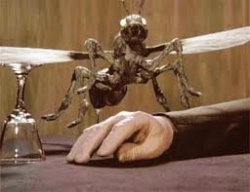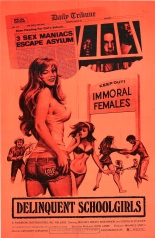
 What happens when you mix escapees from the State Asylum for the Criminally Insane
What happens when you mix escapees from the State Asylum for the Criminally Insane
with the worst-behaving students at the Oxford Corrective Institute for Young Women? The super-sleazy Delinquent Schoolgirls, in which they show up their “chauvinist pig” principal by not wearing their bras to exercise class; in which one fears having her vagina torn apart by a large partner; and in which an elderly herpetology professor (Ralph Campbell, Superchick) hypnotizes a student (Jane Steele) to have his way with her — watch out for snakes, dear!
Acting not entirely unlike The Three Stooges, the crazies — leader Clooney (Michael Pataki, Easy Rider), African-American Big Dick (Bob Minor, Escape from New York) and flaming homosexual Bruce (Stephen Stucker, Airplane!) — first invade the home of nympho housewife Ellie (Julie Gant), whose husband (George “Buck” Flower, They Live) can’t satisfy her needs: “Sex, sex, sex, that’s all you ever talk about: sex,” he says, telling her to stop watching her her “soap oprys.” Big Dick shows her what she’s been missing as Bruce plays the piano and Bruce does a Daffy Duck impression. Screams Ellie mid-rape, “This is positively indecent!”
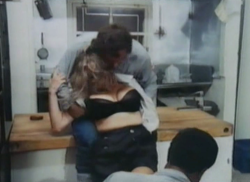 You ain’t seen nothin’ yet. The guys then infiltrate the school during a holiday, where the bad girls have not been allowed to go home. Wacky music plays as the comically large-breasted ladies are molested against their will in the kitchen. Big Dick does so much squeezing, I wonder if Minor contracted carpal tunnel. The next scene, the rapists and their victims are all enjoying a meal together. Later, there’s a slap fight at gunpoint. Good times.
You ain’t seen nothin’ yet. The guys then infiltrate the school during a holiday, where the bad girls have not been allowed to go home. Wacky music plays as the comically large-breasted ladies are molested against their will in the kitchen. Big Dick does so much squeezing, I wonder if Minor contracted carpal tunnel. The next scene, the rapists and their victims are all enjoying a meal together. Later, there’s a slap fight at gunpoint. Good times.
It took three men to write something as misogynist as this, giving Big Dick a refractory period that must hover around two minutes. His appetite for laying pipe inspires most of his dialogue:
• “Hey you guys know somethin’? Well, I’m gonna tell you anyway: I want some pussy!”
• “I never made it with a chick in a trance before.”
• “Aw, man, I don’t want wheels — I want some nookie!”
• “Fantastic! Grapefruit city!”
• “Look at all that young, tender, gorgeous snatch!”
Admittedly, Delinquent Schoolgirls — aka Carnal Madness — is bursting at the seams with beautiful, buoyant babes, including pin-up legend Roberta Pedon, Sharon Kelly (Russ Meyer’s Supervixens) and Brenda Miller, so it’s tough not to appreciate it on an eye-candy level. Just note that doing so may make you feel like, to quote Bruce, a “demented crouton!” —Rod Lott
Buy it at Amazon.
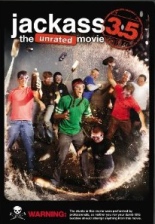
 Between the big-screen Jackass gross-outs, Paramount releases a feature’s worth of outtakes directly to DVD. And let’s face it: Testicular trauma amid Johnny Knoxville and his merry band of pranksters plays just as well as home as the multiplex.
Between the big-screen Jackass gross-outs, Paramount releases a feature’s worth of outtakes directly to DVD. And let’s face it: Testicular trauma amid Johnny Knoxville and his merry band of pranksters plays just as well as home as the multiplex. 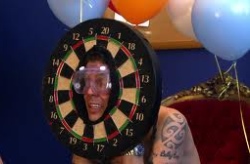 skiing into trees, paintball assaults from an RC helicopter, skateboarding through drywall, exploding cola bottles, skating on belt sanders, enema long jumping, pecker-pecking woodpeckers, flaming gauntlets, electric limbo sticks, fart-propelled darts, horse semen, donkey urine and senior-citizen camel toe that its predecessor clearly lacked.
skiing into trees, paintball assaults from an RC helicopter, skateboarding through drywall, exploding cola bottles, skating on belt sanders, enema long jumping, pecker-pecking woodpeckers, flaming gauntlets, electric limbo sticks, fart-propelled darts, horse semen, donkey urine and senior-citizen camel toe that its predecessor clearly lacked. 

 What happens when you mix escapees from the State Asylum for the Criminally Insane
What happens when you mix escapees from the State Asylum for the Criminally Insane












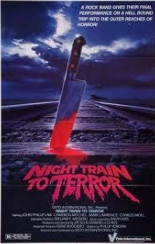
 I defy you to name one other film that offers as much breakdancing, animated monsters, spandex, gushing blood, naked breasts and Bull from
I defy you to name one other film that offers as much breakdancing, animated monsters, spandex, gushing blood, naked breasts and Bull from 